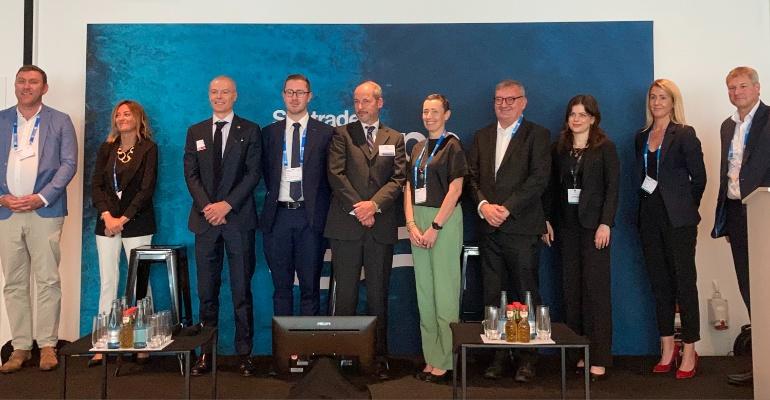A core message was that energy efficiency remains key – especially to keeping older ships in operation as regulations become more stringent.
A combination of measures
Under the European Union's Fit-for-55 legislation and the FuelEU Maritime Regulation, operators will have to reduce their greenhouse gas intensity from 2025, starting with a 2% cut up to an 80% reduction by 2050.
The approaches to achieving this objective vary and are not limited to new propulsion technologies and alternative fuels for new build vessels. ‘Energy efficiency is the key,’ Maikel Arts, GM technical sales at Wärtsilä Marine Power, claimed. Pointing to the fact that future fuels will be more expensive and take up more space onboard, he suggested that a combination of solutions should be considered. Elements could include an engine and turbocharger upgrade, the application of hybrid technology, propeller exchanges, air lubrication and operational measures, such as itinerary amendments to reduce a vessel's speed and therefore its fuel consumption.
Arts further suggested that a step-by-step approach should be taken to identify the most efficient solution. For instance, Piers Strong, technologies BDM at Silverstream, illustrated that air lubrication can be installed onboard existing ocean cruise vessels as a retrofit during scheduled dockings in as little as seven days. The technology helps to reduce friction and prevent fouling while at the same time increasing the ship’s speed. Strong said that fuel savings onboard cruise ships may reach 5-6%, ensuring the investment pays quickly.
Bio-oils and bio-gas for existing ships
A suitable approach for existing ships, without the need to re-engine them, is the Mass Balance System. Linden Coppell, VP sustainability & ESG, MSC Cruises, gave her insight into this approach, describing MSC Euribia’s net-zero voyage from Saint-Nazaire to Copenhagen this spring. For the sailing, MSC purchased 400t of bio-LNG made up of feedstocks including wet and dry manure, whey permeate, food waste, sugar beet residue and sewage sludge. The fuel was delivered to MSC Cruises using mass balance, where the end user is credited for the amount of renewable gas injected into the grid, eliminating the need to segregate and transport the fuel separately. The avoidance of separate transport reduces emissions further existing grid and bunkering infrastructure can be used without the need to build new installations.
Additional crew training required
While existing infrastructure and onboard technology can often be part of the pathway towards climate neutrality, the panel made it clear that additional crew training is required in most cases in order to ensure safe handling of alternative propulsion methods and fuels. Marcel Kind, CEO & founder of Simwave, who has extensive experience in the tanker shipping segment, exemplified how such training could be designed in order to support crew members' skills and their career paths. Key aspects include, according to Kind, the skilful combination of on-site and online training elements including the use of simulators. The objective is to keep training as efficient for crew as possible, in particular when it coms to refresher courses, which are usually required every five years but which can be held online.
That HR and alternative propulsion technologies go hand-in-hand was one of the most important messages from the panel discussion – and a further example that ocean and river cruise operators have multiple opportunities to collectively address sustainability-related challenges.
Copyright © 2024. All rights reserved. Seatrade, a trading name of Informa Markets (UK) Limited.
Add Seatrade Cruise News to your Google News feed.  |

